The year 2016 marked a historic moment in European football as Portugal clinched their first-ever major international trophy by winning the European Championship. This victory was particularly significant for a nation that had been steadily rising in the footballing world for decades, enduring near misses and heartbreaks, most notably their final defeat on home soil at Euro 2004. For Cristiano Ronaldo, already a global icon and considered among the greatest footballers of all time alongside Lionel Messi, this tournament was crucial in solidifying his legacy on the international stage. The question of whether Ronaldo could replicate his club success with his national team was finally answered emphatically in France.
The Pragmatic Leadership of Fernando Santos
Fernando Santos, the man who orchestrated Portugal’s Euro 2016 win, built his coaching career from humble beginnings at Estoril, the club where he spent most of his playing days. His journey took him through various Portuguese clubs, including all of the “Big Three”—Porto, Sporting, and Benfica. He achieved league success with Porto and had brief stints with Sporting and Benfica in Lisbon.
However, Santos’ influence extended beyond Portugal, particularly in Greece where he spent a considerable amount of time managing AEK Athens, Panathinaikos, PAOK, and eventually the Greek national team. Taking over from Otto Rehhagel, the Euro 2004 winning coach, was a daunting task, but Santos successfully guided Greece to the knockout stages of Euro 2012 and the 2014 World Cup. These achievements paved the way for his appointment as the Portuguese national team coach.
Santos quickly established himself as a pragmatic coach. His Portugal side prioritized solidity and tactical discipline over the free-flowing attacking football of previous Portuguese teams. He was appointed after Paulo Bento’s dismissal following a shocking home defeat to Albania in Euro 2016 qualification. Under Santos, Portugal experienced an immediate turnaround, starting with seven consecutive wins, signaling a new era focused on resilience and effectiveness.
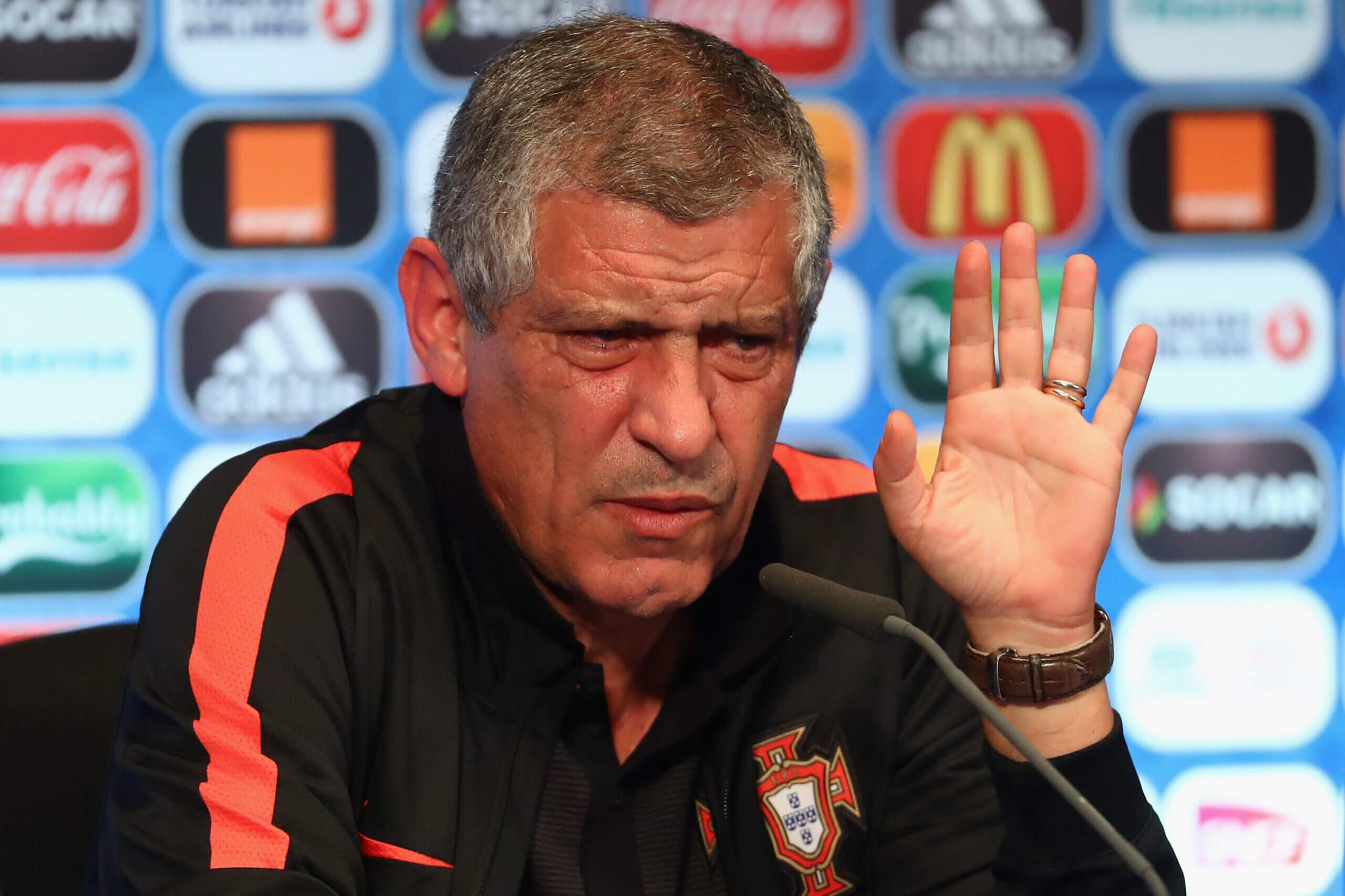 Fernando Santos pragmatic approach led Portugal to Euro 2016 victory
Fernando Santos pragmatic approach led Portugal to Euro 2016 victory
An Unconventional Path to Victory: Group Stage Surprises
In a surprising turn of events, Portugal’s journey to the Euro 2016 title was far from smooth in the group stage. They remarkably failed to win any of their three group matches. Their campaign began with a lackluster 1-1 draw against Iceland. This match became infamous for Ronaldo’s dismissive comments about Iceland’s celebrations, labeling their mentality as “small” and predicting their lack of future success. Ironically, Iceland went on to win more matches in regulation time than Portugal in the tournament.
Portugal’s struggles continued with a goalless draw against Austria, where Ronaldo even missed a penalty. The final group game against Hungary was a rollercoaster 3-3 draw, with Portugal trailing three times. Ronaldo, however, found his scoring boots in this match, netting twice in a thrilling encounter.
These three draws meant Portugal finished third in their group. Historically, this would have resulted in elimination. However, Euro 2016 was the first edition to feature 24 teams, expanding from the previous 16. This expansion allowed Portugal to qualify as one of the best third-placed teams. Furthermore, this placed them on what was perceived as the less challenging side of the knockout bracket. While pre-tournament favorites like Spain, Italy, France, Germany, and England were all placed on one side of the draw, Portugal, alongside Croatia and Belgium, were considered the main contenders on the other side, none of whom had previously won a European Championship.
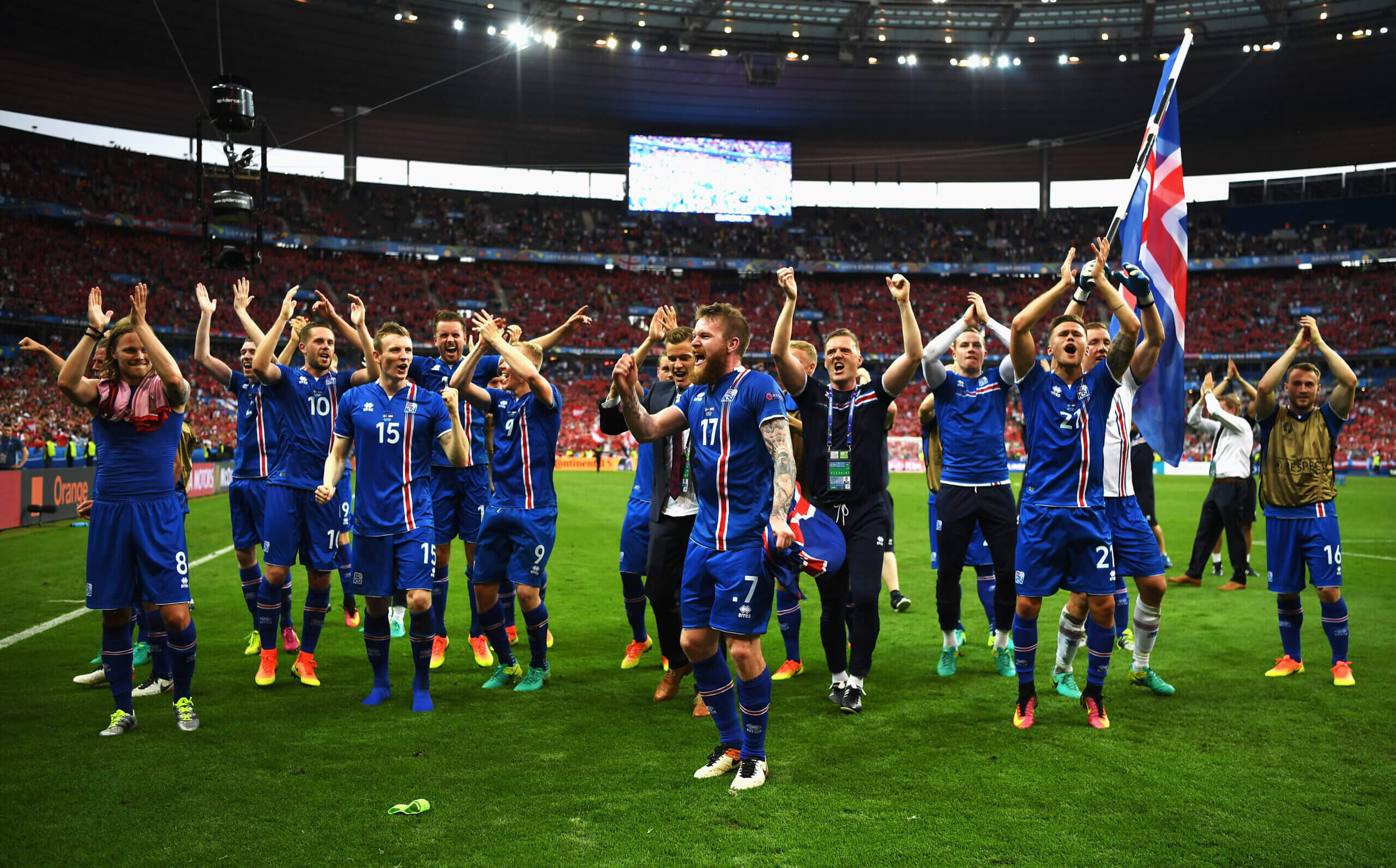 Iceland's Euro 2016 performance surpassed Portugal's group stage wins
Iceland's Euro 2016 performance surpassed Portugal's group stage wins
Tactical Flexibility: Adapting to Ronaldo’s Strengths
For two decades prior to Euro 2016, Portugal was renowned for producing gifted wingers but often lacked a world-class center-forward. While players like Nuno Gomes, Joao Pinto, and Pauleta were effective, the issue of a central striker became more pronounced leading up to the tournament. However, in Cristiano Ronaldo, Portugal possessed arguably the most prolific goal-scorer in European football.
Despite primarily playing on the left wing for Real Madrid, Ronaldo’s goal-scoring prowess was undeniable. Recognizing the absence of a traditional top-tier striker, Santos adjusted Portugal’s tactical approach. He shifted towards a system resembling a 4-4-2 formation. This allowed Ronaldo to operate in his preferred inside-left role, with Nani mirroring him on the right, albeit in a slightly deeper position. The midfield often consisted of four central players, sometimes resembling a diamond, other times a flat four, providing tactical flexibility and compactness.
Compared to Portugal’s usual 4-3-3, the tactical tweak essentially involved sacrificing a striker for an additional central midfielder. This adjustment is somewhat comparable to Spain’s tactical evolution between Euro 2008 and Euro 2012.
While not always a spectacle in terms of goals – Portugal scored nine goals in the equivalent of eight matches considering extra time periods – this tactical setup proved highly effective. Portugal excelled at controlling games both in possession and defensively. Dynamic space management was key, with Raphael Guerreiro providing overlapping runs on the left and Nani or the right midfielder ensuring width on the right flank.
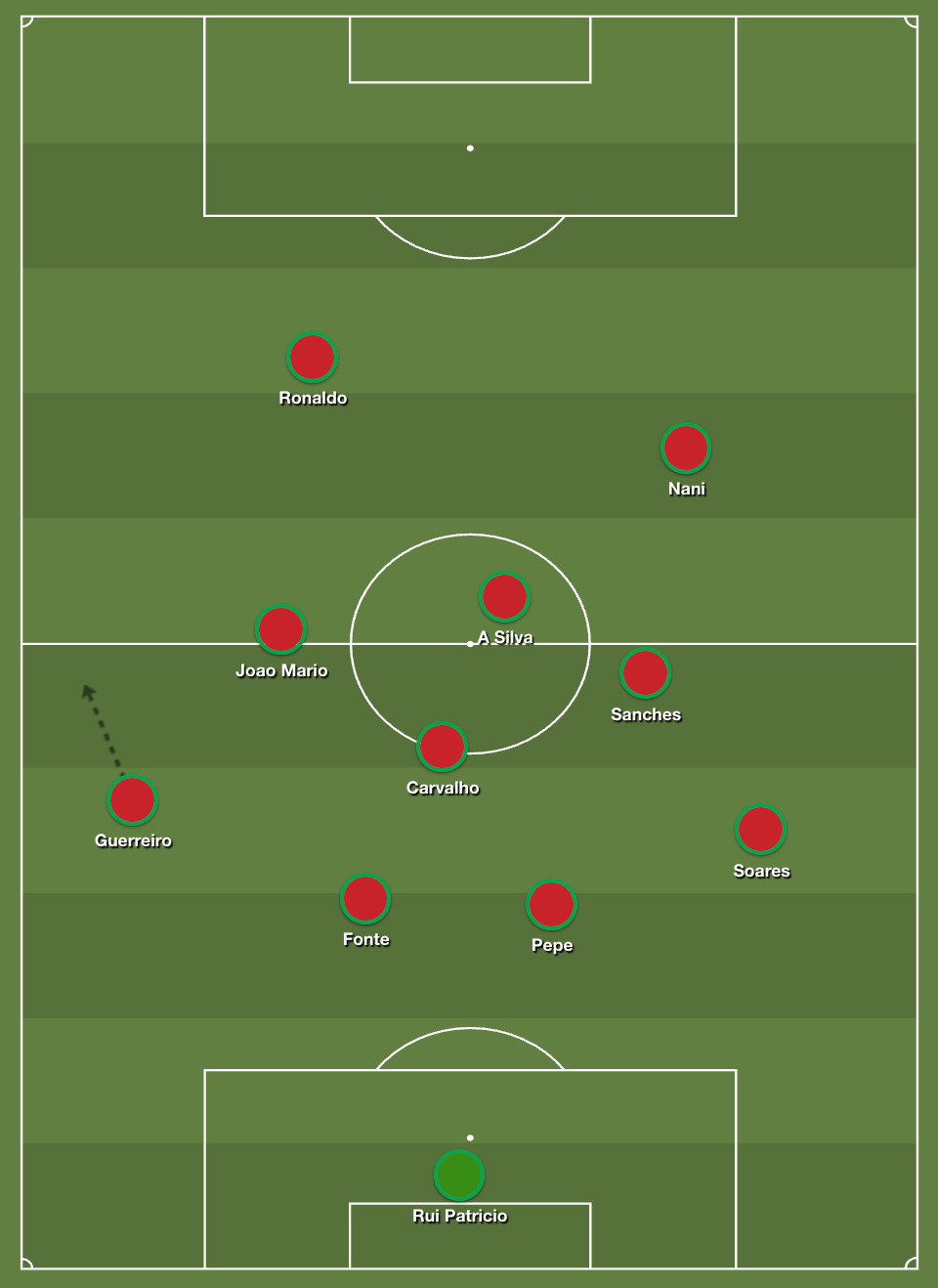 Portugal's Euro 2016 Formation and Tactics
Portugal's Euro 2016 Formation and Tactics
Key Players: Ronaldo’s Leadership and Pepe’s Defensive Masterclass
Cristiano Ronaldo, the undisputed talisman of the team and future Ballon d’Or winner, was pivotal to Portugal’s success. He scored three goals in the tournament, led the attack effectively as a center-forward, and served as the team’s inspirational leader, both on and off the pitch. Even after his unfortunate injury in the final, his presence on the sidelines remained a source of motivation.
However, arguably the most consistent performer for Portugal throughout the seven matches was the veteran center-back, Pepe. The 33-year-old Brazilian-born defender had transformed his game. Initially used as a holding midfielder and once known for his aggressive and sometimes rash defending, Pepe had matured into a composed and dependable defensive rock.
Throughout Euro 2016, Pepe was dominant in aerial duels and provided crucial defensive stability. Despite a thigh injury that forced him to miss the semi-final against Wales and limited his training before the final, Pepe delivered a man-of-the-match performance in the final against France, effectively neutralizing the host nation’s attack.
Remarkably, at 41 years old, Pepe is poised to participate in his fifth European Championship in 2024, a testament to his longevity and enduring quality, especially considering he only became eligible to play for Portugal at the age of 24.
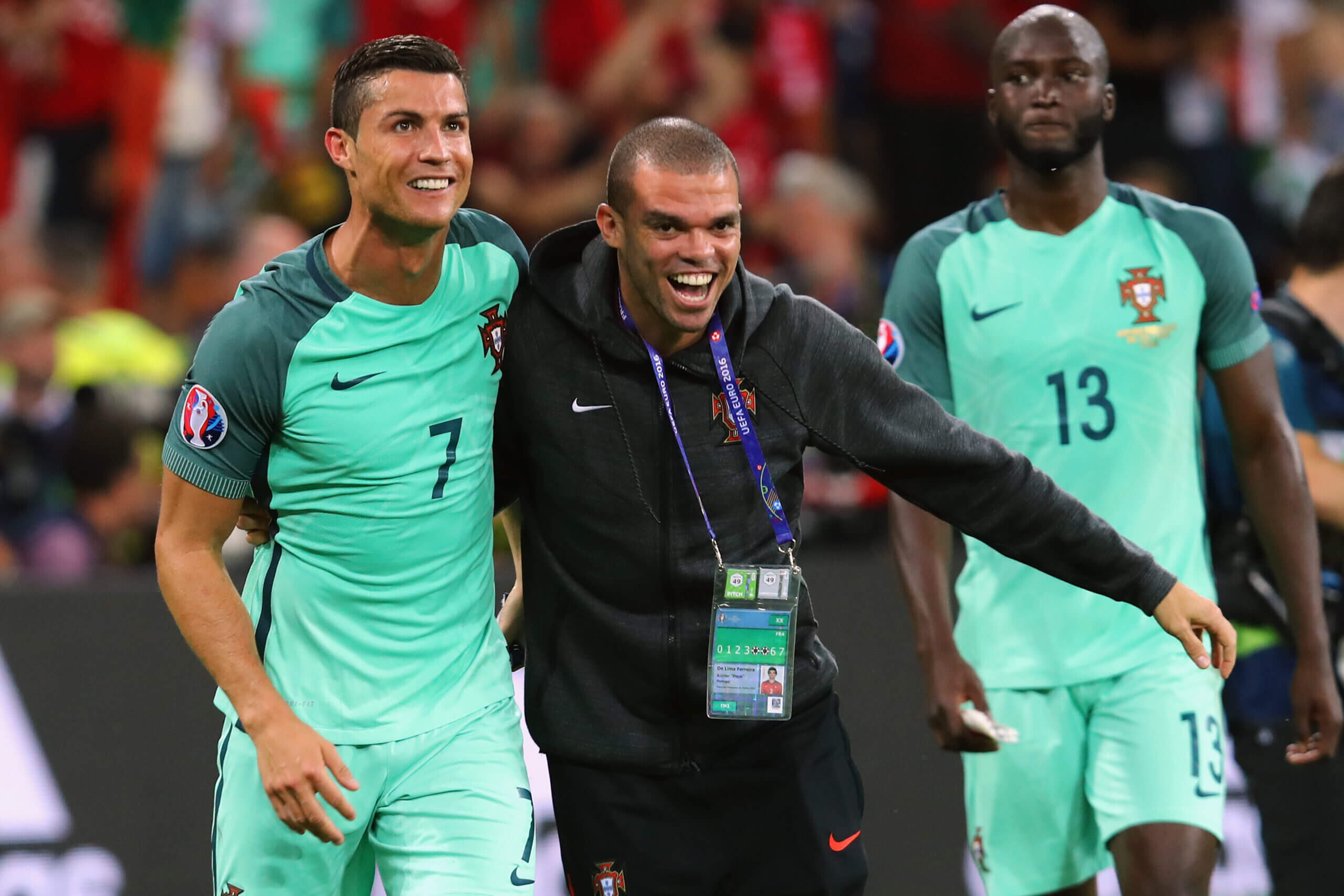 Cristiano Ronaldo and Pepe pivotal figures in Portugal's Euro 2016 victory
Cristiano Ronaldo and Pepe pivotal figures in Portugal's Euro 2016 victory
The Final in Paris: Overcoming Adversity
The Euro 2016 final was hosted in Paris, providing France with the home advantage, much like Portugal had experienced in the Euro 2004 final which they lost. Adding a bizarre pre-match element, the Stade de France was plagued by moths, attracted by the stadium lights left on the previous evening. Despite attempts to clear them, the moths remained a surreal backdrop to the final.
The game itself was significantly impacted by an early injury to Cristiano Ronaldo. Sustained within the first ten minutes, it eventually forced his substitution around 25 minutes into the match. He was replaced by Ricardo Quaresma, his former Sporting teammate, who had scored a vital goal against Croatia in the round of 16 but was not a consistent goal threat. Portugal adjusted to a 4-5-1 formation, with Nani as the lone striker, and struggled offensively, failing to register a shot on target until the 80th minute.
France, despite being the home side, also struggled to create clear-cut chances. Moussa Sissoko, a box-to-box midfielder playing on the right wing, was arguably France’s most dangerous attacker, highlighting their offensive limitations on the night. Antoine Griezmann, the tournament’s top scorer and best player, came close with a couple of headed attempts, but France lacked the cutting edge.
Both teams struck the woodwork – Andre-Pierre Gignac for France in normal time and Raphael Guerreiro for Portugal in extra time. The match was tense and cagey, with a sense that a single goal would decide the outcome.
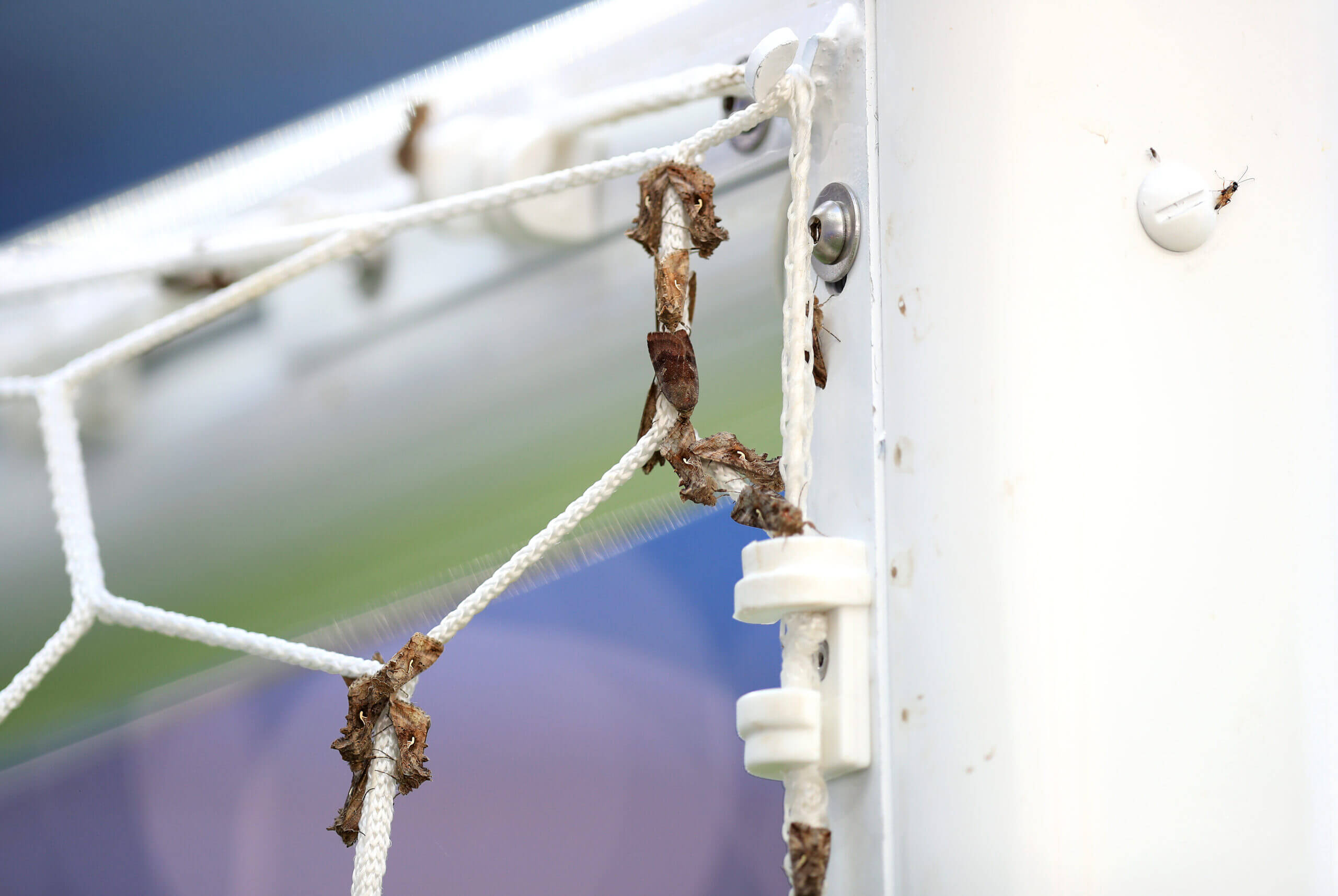 Moth infestation at Stade de France before Euro 2016 Final
Moth infestation at Stade de France before Euro 2016 Final
Eder’s Decisive Strike: An Unlikely Hero Emerges
The Euro 2016 final is perhaps best remembered for the unlikely hero who emerged to score the winning goal: Eder. Born in Guinea-Bissau, Eder moved to Portugal as a child. Despite a modest club career, including a barren spell at Swansea City, he earned a place in the national team.
Prior to the final, Eder had only played 13 minutes in the tournament and had not featured in the knockout stages. When Ronaldo was substituted, many expected another winger to replace him. However, with ten minutes left of normal time, Santos made a crucial substitution, bringing on Eder, a recognized striker, for midfielder Renato Sanches.
In the 109th minute of extra time, Eder received the ball with limited support, held off Laurent Koscielny, and unleashed a powerful low shot from 25 yards that beat Hugo Lloris and found the back of the net. Eder, the unexpected substitute, became Portugal’s Euro 2016 hero. His goal, the most important in Portuguese football history, was also a nod to Portugal’s long history of international players originating from Africa, including legends like William Carvalho, Rui Jordao, Mario Coluna, and Eusebio.
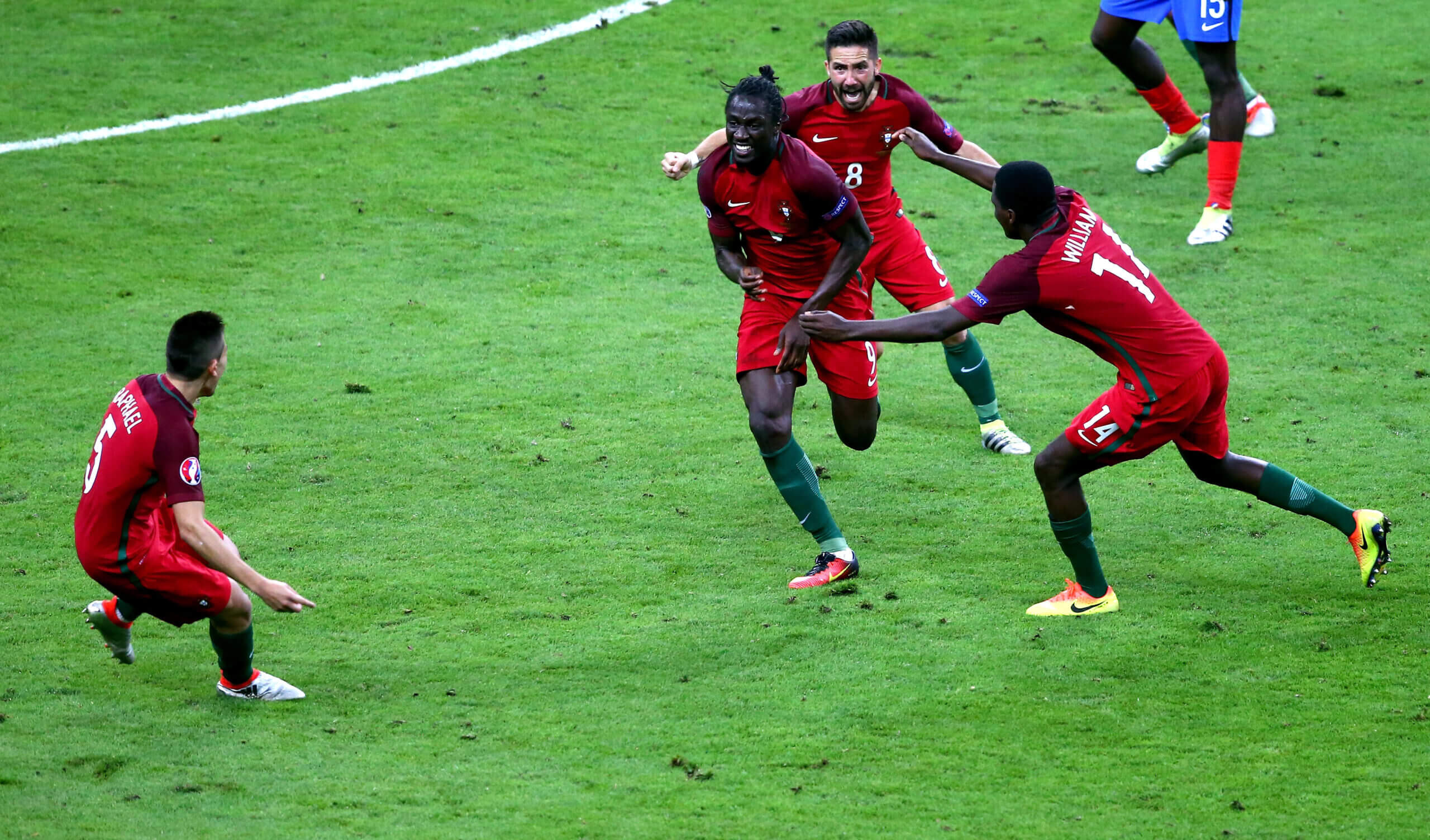 Eder celebrating his winning goal in Euro 2016 final
Eder celebrating his winning goal in Euro 2016 final
Were Portugal the Best Team? A Matter of Perspective
Statistically, Portugal were far from being the most dominant team at Euro 2016. Their journey was characterized by narrow escapes and late drama: no wins in the group stage, a 117th-minute winner against Croatia, a penalty shootout victory against Poland, a favorable semi-final draw against Wales, and finally a 109th-minute winner in the final. Portugal led for only 11 percent of the tournament, a mere 73 out of 720 minutes played.
Arguably, France or Germany, who contested the other semi-final, or even Italy, who defeated Spain before losing to Germany on penalties, could be considered stronger teams overall. Some might argue that Portugal fielded better teams in previous Euros, such as in 2000, 2004, 2008, and 2012.
However, Portugal’s Euro 2016 victory was more than just about being the best team in the tournament. It represented the culmination of decades of development in Portuguese football. Having historically struggled to qualify for major tournaments, Portugal had become a consistent presence in the knockout stages by 2016. Their Euro 2016 triumph was an overdue and deserved reward for their growth as a footballing nation, proving that sometimes, resilience, tactical acumen, and a bit of luck can be just as important as sheer dominance.
(Top photo: Pressefoto Ulmer via Getty Images)
